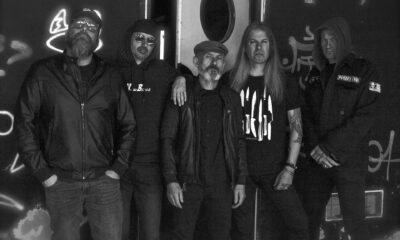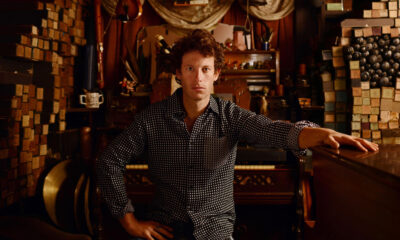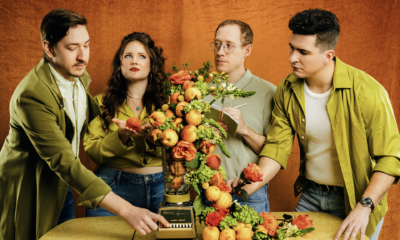Film
Acting Coach Michelle Danner Discusses Her Career, Immaculate Techniques, and “Golden Box” Approach [w/ Audio]
Attracting the likes of Penelope Cruz, Chris Rock, and Seth McFarlane, Michelle Danner has become one of the most renowned acting teachers. We spoke with Danner about her career, techniques, and Golden Box approach.

Michelle Danner has become one of the most renowned acting teachers in the world thanks to her impeccable teaching techniques when it comes to the performing arts and taking her class known as the Golden Box across the globe. She has been teaching her two-day intensive crash course that dissects all of the essential tools and techniques an actor needs to bring a character to life on stage or on screen.
If you think all of that sounds impressive, her list of alumni clients reads like a Hollywood agent’s contact list. Danner has taught the likes of Christian Slater, Salma Hayak, Gerard Butler, Seth McFarlane, Penelope Cruz, Chris Rock, Gabrielle Union, Zooey Deschanel and many more. On top of that, Danner has also directed countless stage productions and is currently prepping her next feature film, The Runner, and still managed to squeeze in some time to chat with us about her approach to acting, studying at the prestigious Stella Adler Actors Studio, her approach to crafting characters, and more.
What was your very first formal acting experience?
Michelle Danner: “It was a play that I did and I was a teenager in Paris called Antigone, a Greek tragedy and I did that with a whole group of wonderful actors and we were very well received within front of five hundred people and I loved that live experience of being in front of people and people donated with friends and gave donations to come and see it, they applauded so loud we had to come back out in France. It’s not like the U.S. You applaud one time, two times and that’s how it is.
In Europe and France, they keep coming out as long as people keep applauding, we keep coming out and taking a bow, I can’t remember how many times, it seemed like an eternity. We split the donations amongst all the actors. It was an incredible experience to bring this place to life, my earlier memory of something absolutely fantastic that happened to me.”
Absolutely. How did you manage to use yourself as a conduit to be able to translate that enthusiasm and deep-seated passion for it into a career?
Danner: “I was born into the daughter of an agent and a producer, my dad.”
That will do it.
Danner: “He was the first William J. Morris agent in Paris in the early ‘60s at Le Chance in Paris and I grew up, I was born in New York, but we moved to Paris when William Morris made him president of the first offices. I was under his desk a lot, and he brought a lot of wonderful performers to the house, he repped Marlene Dietrich and Sammy Davis Jr. I grew up with showbiz, that then translated me in loving literature, reading plays quite a lot.
I used to read everything that I could get my hands on and going to the conservatory in Paris and I was a young aspiring actress, and the conservatory of Versailles, classes in France. Then when I was 15 we moved back to the States and I started with Stella Adler and I studied with Uta Hagen and a slew of extraordinary teachers in new York where my passion has been ignited at a very young age my flame stays very lit. 1990 I moved to LA where I continued my passion.”
Paris in the ‘60s right at the height of the excitement and publicized era of the French new wave and French neo-realism coming to the forefront of global cinema, it must have been a really exciting time to be a part of that.
Danner: “Oh yes, I remember cutting several of my classrooms to go watch movies including Gene Wilder’s Frankenstein. I was not only an avid reader but a moviegoer. I have two sons and my 16-year-old son watches one movie a day. He literally days ago turned 17 (so) that passion has been passed down to him. So yes, it was a great time to grow up and to be in France, and then to come to New York with lots of theatre in New York before coming to LA. Then the natural progression of wanting to tell stories to a bigger audience, a bigger classroom, and you start to make movies, which is what I’m doing, I’m on my fifth feature film. I do documentaries and shorts, and I’m very excited to keep telling stories that I’m passionate about.”
Yeah, because one quick question I wanted to squeeze in while you mentioned studying at the legendary Stella Adler Institute, I wondered if you ever got a chance to take any classes with Lee Strasberg (Strasberg was a world-renowned acting teacher famous for his Academy Award-nominated performance in The Godfather Pt. II)?
Danner: “No, I did not. I studied with Stella, I studied with Uta, I studied with Bill Astor. Grace Coen, I studied Stanislavski (famed method acting technique) with her for a year, but I never studied directly with Lee Strasberg.”
Well, hey, that’s still one hell of a repertoire there.
Danner: “Yes, I was still lucky enough to be exposed to teaching from iconic teachers. They inspired and also inspired me to pass it down. I was just talking to a wonderful actor that I’ve known for many years, and he works, he’s a working actor, and he comes to class in the theatre because I have a center for the arts and a wonderful faculty of teachers. So when I go to make a movie, and I get to step away a little bit, I have wonderful teachers that take over. I think we have a true responsibility to pass this down, to pass down this knowledge.”
To pass the torch?
Danner: “So a younger generation can be enlightened, to be woken up.”
Absolutely. So what is it like to see people transform themselves, not just into a character they might be playing or reading on paper, but to see them truly breathe a real life into them?
Danner: “It’s an extraordinary thing to process and the process is an extraordinary thing. To watch somebody work a character because they’re excited about telling the story, and immerse themselves in the circumstances and they start to take on the skin of another person that’s not them, but they make it part of them. To watch that transformation always feels very privileged, and I work with actors in different ways. I work with actors in my classes, I work with actors privately on projects that they’ve either been cast for or hoping to get and then I work with actors on set when I make a movie. So, I’m privy to watching actors process quite a lot.”
https://youtu.be/UeXZkT03vrg
Yeah, absolutely. One question I definitely wanted to ask was, what are some of the immersive and really inspiring qualities that you can see actors start to take on in their real lives after having such powerful experiences playing other characters? In the sense that, do you think you find that it can inspire people to be more empathetic and compassionate to others, and maybe some other things that impact them in positive ways in their real life?
Danner: “Well, Alex, I think that’s a really great question. I think that sometimes in a positive way, sometimes in a not so positive way, the characters that you take on can change where and how it affects you, yes. I think it can help you on all kinds of levels with compassion, and understanding, and risk-taking. Not that I don’t take risks, because I do, but that inspires me to be more of a risk-taker, so I think absolutely. Depending on what the story is and I think a lot of the time, is it something a little bit more intense? Is it something that you don’t want to seep into you? You have to work to distance yourself a little bit and to shake it off, right? So, it can go both ways. But, absolutely, it can help you grow as a human being, to work on a character, depending on who they are, and what they’re about.”
Yeah, absolutely, and to follow that up, what’s it like to see somebody that might be more well-known as a movie star, and then see them transform themselves into more of an actor right before your eyes? And see them come in with a lot of raw talent and see them refine that skill set and translate that into a big screen type project? It’s got to be incredibly exciting, not just to watch them transform into a character, but also transform as a performer and as a person.
Danner: “Oh yeah, absolutely. You know, there’s something to the art form of acting, the telling of a story that is incredibly meaningful to you, that at times can be incredibly heartbreaking, moving, funny. It’s a great challenge and responsibility, and learning lessons, you learn all kinds of lessons. You learn from every character that you ever play. And then there’s how it affects audiences, whether it’s on film, or in the theatre, how people react and respond to it.”
Absolutely. I’m sure there’s got to be some aspects that you can’t dive into 100 percent, but I was just wondering if you could let the listeners know a little bit about what the Golden Box entails? And what are some of the qualities you look for in a student in order to open them up as a performer in more ways than even they probably expected?
Danner: “A student can come when they are in different stages of their lives. Whether they’re beginners, they’re just starting out, some people have lots of training, they work a lot, they come in between jobs to keep them stretching their instrument. So, there are different levels but I hope that they come with an openness and a desire to learn. A desire to be a sponge and to take it all in. That, I think first and foremost would be a good thing to possess, when you’re starting, or you’re coming to class, to just be open. To come from this place where you don’t know, you want to learn. But the Golden Box is a very interesting class. I’ve taught the Golden Box in many incarnations for the last, I’m starting to age, so with every year, it’s becoming scarier and scarier. We’re in 2019, so I started to teach it in 1992, so that’s 27 years ago.”
Well, something about it must work.
Danner: I started where I had about 25 students. I would always do it on the weekend, and I would do it every other month, and so many of those students within the next couple of years had gone on to become very famous. But I have pictures, images of them in my mind of them on the floor, or on the couch, or sitting, or them curled up taking notes. So it started like that, it started with me trying to teach an intensive class about what it’s like to really create a character from scratch that sticks, that’s really in your DNA. Also, how to break down material, how to analyze a script. I also think that, at the time, actors were a little weaker with their script analysis tools, I feel like they’re now much stronger. There’s something about each generation, they’re smarter than the last one (when it comes to script analysis).
I feel like this generation is very savvy with script analysis. That doesn’t mean that you don’t have to work on it, but they’re savvy. Maybe because when you go to school, there are more debate teams, there are more analysis classes, there are more literature classes, whatever the reason is. There are more products, maybe people are reading more, or getting information quicker on the internet. But in any event, it’s a two-day intensive (workshop), but now I don’t teach it in my living room anymore. I teach it in my theatre, I was lucky enough to find a beautiful theatre, and I was able to raise money from lots of wonderful people, generous people. Steven Spielberg was there, Kate Capshaw, Neil Simon was on our honorary board when he was alive. So I had these really incredible people that helped us, we have two theatres where we do wonderful, creative things.
In fact, next year I’m about to do a one-woman show with Anne Archer based on the life of Norris Church, the last wife that Norman Mailer had for 30 years. She wrote a book called, A Ticket to the Circus, and it was adapted into a wonderful one-woman show, and I’m directing Anne Archer. Now I teach the Golden Box in these theatres and I do it as a series. It’s a mix of many things that I do, exercises, lectures, of course, I do with film clips, music is a part of it, it’s a rollercoaster ride is what it is. People love this class, and I’ve taught it all over the world, including South Africa, Johannesburg, Cape Town, Moscow, St. Petersberg, Paris, South America, Lima, Peru, Guatemala, Vancouver, Toronto… all over the world.
I’m going to teach it in two weeks in Hawaii, I’m very excited about that. I just taught it right here in LA, and it’s basically a two-day intensive where I break down all of the tools for an actor, their toolbox, their Golden Box. I always say that an actor on set to get experience and to learn life lessons, so all of these tools go into their Golden Box. So that’s what the class is. People love the class and I love teaching it because depending on where I am creatively I don’t just teach, I direct. Wherever I am in my creative process, wherever I’m at, I bring that to that weekend. So, of course, I have a Powerpoint, and I know what I’m going to show, a lot of the stories that I’m going to tell, but it always gets inventive. It always becomes somewhat improvised.
Well, wonderful, I honestly think that’s the perfect place to leave it, so thank you very much.
-

 Music6 days ago
Music6 days agoTake That (w/ Olly Murs) Kick Off Four-Night Leeds Stint with Hit-Laden Spectacular [Photos]
-

 Alternative/Rock7 days ago
Alternative/Rock7 days agoThe V13 Fix #010 w/ High on Fire, NOFX, My Dying Bride and more
-

 Alternative/Rock2 weeks ago
Alternative/Rock2 weeks agoA Rejuvenated Dream State are ‘Still Dreaming’ as They Bounce Into Manchester YES [Photos]
-

 Features6 days ago
Features6 days agoTour Diary: Gen & The Degenerates Party Their Way Across America
-

 Culture1 week ago
Culture1 week agoDan Carter & George Miller Chat Foodinati Live, Heavy Metal Charities and Pre-Gig Meals
-

 Music1 week ago
Music1 week agoReclusive Producer Stumbleine Premieres Beat-Driven New Single “Cinderhaze”
-

 Alternative/Rock1 week ago
Alternative/Rock1 week agoThree Lefts and a Right Premiere Their Guitar-Driven Single “Lovulator”
-

 Alternative/Rock2 weeks ago
Alternative/Rock2 weeks agoDeath Wishlist Are Fiery and Fierce with Their “I Get Bored” Video Premiere













